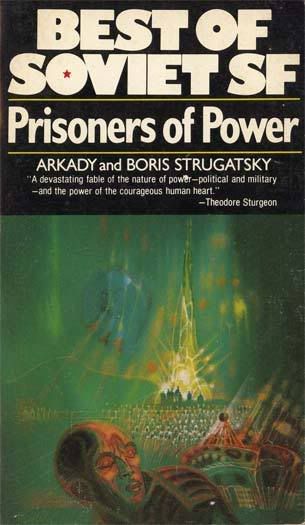New Russian SF Film in production: Strugatskys' The Inhabited Island
The global success of Russia's Nightwatch and Daywatch films may be leading to a renaissance of fantasy/science-fiction movie projects in that country. Now being filmed in Russia, Arkady and Boris Strugatsky's The Inhabited Island, a.k.a. Prisoners of Power, scheduled for release in January 2009.
From the Wiki:
Prisoners of Power also known as Inhabited Island (Russian: Обитаемый остров, IPA:[obɪ'taʲemɨj 'ostrof]) is a science fiction novel written by Soviet authors Arkady and Boris Strugatsky. It was written in 1969 and originally published in 1971, the English translation was released in 1977. The protagonist is a young adventurer from Earth — Maxim Kammerer who gets stranded on an unknown planet Saraksh.
The story describes the adventures of Maxim Kammerer. Kammerer is an amateur space explorer from Earth. This occupation is not considered serious and Kamerer is regarded as a failure by his friends and relatives. The novel starts when Kammerer accidentally discovers an unexplored planet Saraksh inhabited by a humanoid race. The level of technological development on the planet is similar to mid-20-eith century Earth. Recently, the planet had a nuclear and conventional war and the predicament of the population is dire. When Kammerer lands, the natives mistake his spaceship for a weapon and destroy it.
At first, Kammerer does not take his situation seriously. He imagines himself a Robinson Crusoe stranded on an island inhabited by primitive but friendly natives. He is looking forward to establishing contact and befriending the population of the planet. However, the reality turns out to be far from glamorous. Kammerer finds himself in the capital of a totalitarian state, perpetually at war with its neighbors. The population is governed by the oligarchy of Unknown Fathers through brutal police and military repression. The city is grim and polluted. Ordinary populace leads the life of privation and misery. What goes on around Kammerer does not make sense to him, since his own society is free from war, crime and material shortages.
Eventually, it is revealed that to maintain the loyalty of the population, the Fathers employ mind control broadcasts. The broadcast towers pepper the landscape of the country. The mind-altering capabilities of the towers are kept secret, they are disguised as ballistic missile defense installations. Constant broadcasts suppress the ability to evaluate information critically, hence making the omnipresent regime propaganda much more effective. In addition, twice a day, intense broadcasts relieve mental stress caused by the disconnect between the propaganda and the observed reality by inducing an outburst of blinding enthusiasm.

Technorati tags: science fiction, sci-fi, movies, films, Russia
Labels: film, films, movies, Russia, sci-fi, science-fiction





3 Comments:
Thanks for posting the trailer. This should be a good movie. (I hate that it will not be released for another two years!!!) Is there a place where I can get Russian SF movies subtitled in English. I would like to watch the ones adapted from Bulychev's stories. Thanks and God bless.
Hello, your SF blog is great, it's sheer pleasure to read it.
If you don't mind, I have used the info in your blog to share the good news about the making of the new Strugatsky film with my Hungarian readers. Thank you; we all love Russian sf and Russian films here.
Chelloveck
gificor: The only science-fiction film based on Bulychev's work that I know is available in the USA is the animated version of The Mystery of the Third Planet. It was redubbed in English as part of Mikhail Baryshnikov's Stories from My Childhood video series. Unfortunately, the original musical score was also replaced in the dub. There are other DVD versions available for purchase that would work in the US, but I have no information about them. You can see chapters of the animated version here: The Mystery of the Third Planet.
A DVD release of Guest from the Future, the 1985 five-part Russian TV mini-series based on Bulychev's One Hundred Years Ahead can be found online, but it doesn't have English sub-titles or an English-language audio option.
Most of Russia's classic science-fiction films have not yet been released in the West, with the exceptions of Solaris, based on Stanislaw Lem's novel and remade in Hollywood in 2002, and Stalker. I'm waiting for The Heavens Call (Nebo Zovet), which was dubbed and butchered into the Roger Corman's Battle Beyond the Sun. I wish Planet of Storms (Planeta Bur) would make it to the West in its original form, too. You can see it in Russian on YouTube. Planeta Bur was also re-edited, dubbed, and hacked by Roger Corman to create the awful Voyage to the Prehistoric Planet, and Voyage to the Planet of Prehistoric Women.
But even though Russia's science-fiction films haven't been forthcoming, there are many wonderful fantasy films now available from Rusico, such as Ilya Muromets, Ruslan and Ludmilla, and even a first-class horror story, Viy.
Péter: My greetings to Budapest. Yes, please share my blog posting with your readers and science-fiction fans in Hungary. I published my blog under a Creative Commons license, so its content may be reproduced elsewhere as long as there is attribution to the original source and it is not used in any for-profit endeavor. I see that science-fiction fandom is alive and well at http://www.avana.hu and http://www.scifi.hu. Köszönöm szépen!
I plan to write about Solaris and Ilya Muromets (The Sword and The Dragon) in future blog postings. Both are special favorites of mine, and I have a personal connection to the latter film going back to when I was four years old!
Post a Comment
<< Home